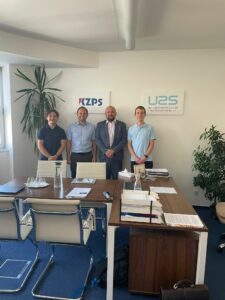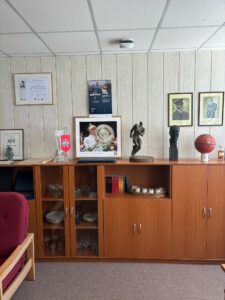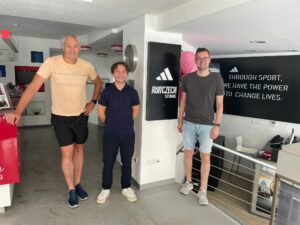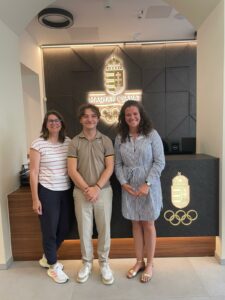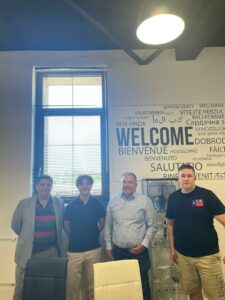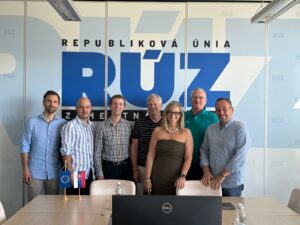As part of its long-term mission to promote a more inclusive, ethical and socially responsible European sport model, the European Association of Sport Employers (EASE) recently carried out a strategic mobility mission across Central Europe, with key stops in the Czech Republic, Hungary, Slovakia, and Austria.
This tour was part of EASE’s ongoing Erasmus+ efforts to:
-
Strengthen cooperation with national employers’ organisations and sport institutions,
-
Disseminate the key deliverables of the ESCSE – European Social Charter for Sport Events,
-
Promote inclusion in sport through the BeST Inclusion project, which focuses on gender, age, and disability.
Czech Republic: Engaging with Employers and the Mass Sport Movement
In Prague, EASE had the opportunity to meet with three major actors in the Czech sport landscape:
-
UZS, the Czech Association of Employers in Sport
-
RunCzech, one of the most prominent organisers of mass participation running events in the country
-
Czech Union of Sports, a major umbrella organisation representing national sport entities
These meetings were the occasion to present the ESCSE Charter, and to collect valuable feedback on how inclusion is addressed at local and national levels. The Czech stakeholders expressed interest in further collaboration, particularly around supporting professional pathways in sport, particularly as part of a project focused on the professional retraining of female athletes at the end of their careers, and amplifying the visibility of social responsibility principles in large-scale events.
Hungary: Dialogue with the Hungarian Olympic Committee and BusinessHungary
In Budapest, EASE continued its mobility activities with two high-level meetings:
-
The Hungarian Olympic Committee, which plays a central role in the governance and promotion of sport in Hungary
-
BusinessHungary (VIMOSZ), the national employers’ confederation, representing the voice of businesses across all sectors
Discussions focused on:
-
The integration of social charter principles into elite and grassroots sports governance,
-
The potential for joint actions to promote diversity, equity, and inclusion,
-
And the growing importance of dialogue between sport and labour sectors at both national and EU level.
These conversations reinforced the shared ambition to bridge the gap between public authorities, employers, and sports federations in shaping socially sustainable sport policies.
Slovakia: Opening the Door to Long-Term Cooperation
The next stop of the tour took EASE to Bratislava, capital of Slovakia.
The first meeting was held with the National Union of Employers (RUZ), a key organisation for representing employer interests in Slovakia. The discussion allowed both parties to share insights on:
-
The specific needs of sport organisations in the Slovak labour market,
-
The importance of aligning sport policies with employment strategies,
-
And the value of European-level tools such as the ESCSE Charter.
EASE also visited the Slovak Olympic and Sports Committee, where Secretary General Mr. Jozef Liba welcomed the delegation. As a strong public authority, the Committee can play a major role in spreading EASE’s tools across its network of federations. Both sides expressed interest in building long-term cooperation focused on responsible sport governance and inclusion.
Austria: Connecting with the Austrian Basketball Federation
The Austrian leg of the mobility finally brought EASE to Vienna, where the team had a productive meeting with Aldin Saracevic, Secretary General of the Austrian Basketball Federation.
This exchange allowed EASE to:
-
Understand the structure and challenges of Austrian sport employment,
-
Showcase the ESCSE and BeST Inclusion tools,
-
And identify promising opportunities for future collaboration between EASE and the Austrian federation.
The meeting also provided a gateway into Austria’s wider sport ecosystem, which EASE hopes to explore further through future partnerships.
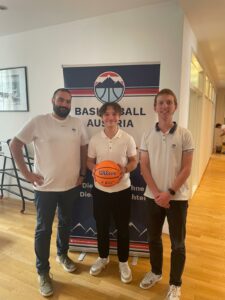
A European Network in Motion
This Central European tour confirmed the relevance of EASE’s mission:
To build bridges between sport and employment, to foster inclusion in all forms, and to ensure that sport events across Europe are guided by social responsibility, ethical values, and sustainability.
Each stop enabled valuable knowledge exchange and opened new pathways for collaboration, reinforcing EASE’s role as a unifying voice for sport employers in Europe.
We sincerely thank all the organisations and individuals who hosted us and look forward to the next steps of cooperation across the continent.
